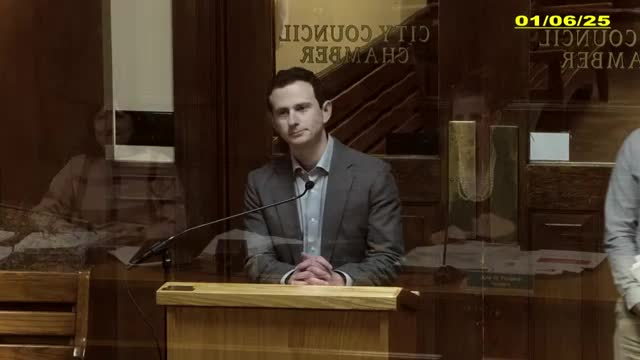Clean Energy advisory committee urges council to adopt state's Specialized Energy Code; resolution referred to legal affairs
Get AI-powered insights, summaries, and transcripts
Subscribe
Summary
The Clean Energy Advisory Committee presented the state's Specialized Energy Code and recommended adoption to make Beverly eligible for Climate Leaders funding; Councilor Hausman filed orders and they were referred to legal affairs for further study.
Jordan Stutt, chair of the Clean Energy Advisory Committee, told the council on Jan. 6 that the committee voted to recommend adoption of the state's Specialized Energy Code to raise energy-efficiency standards for new construction and to qualify Beverly for the state's Climate Leaders grant program.
The nut graf: the code would affect new construction, set additional requirements for buildings using fossil fuels and create pathways that either require all-electric construction or, for mixed-fuel buildings, pre-wiring for future electrification and on-site solar where feasible. Adoption is a prerequisite for a Climate Leaders grant that can provide up to $1 million for capital renewable or decarbonization projects.
Dylan Patel of the Massachusetts Department of Energy Resources said the code targets operating emissions from new building stock and creates a two-path approach: all-electric buildings follow the existing stretch code; mixed-fuel buildings must be “electrification ready” (pre-wiring) and include on-site solar where feasible. Patel explained that multifamily residential projects under the specialized code are expected to meet passive-house level thermal-envelope performance in many cases.
Affordability and costs: Stutt addressed affordability concerns by citing examples of passive-house multifamily projects that carried modest cost premiums (the Harbor Village project in Gloucester was cited with a 1.8 percent premium). Committee witnesses reported a median pre-wiring cost for single-family mixed-fuel homes of about $4,000 and estimated a 4-kilowatt residential solar system at roughly $12,000 before credits; federal and state incentives, including a 30 percent federal tax credit under current law, reduce net costs for many projects.
Policy and process: Councilor Hausman filed a set of orders and a draft resolution to begin the formal process; the submissions (Orders 30–30D) were referred to the Committee on Legal Affairs for review. Hausman said he intends to hold a standalone Legal Affairs session with the committee and Department of Energy Resources representatives for extended Q&A before the council acts.
Q&A highlights: Councilors asked what the code would require of single-family and multifamily buildings; Patel clarified that the passive-house requirement applies to certain multifamily buildings and that the specialized code “has to be adopted as is with no amendments” to qualify for Climate Leaders eligibility. Stutt said the committee sees the code as a way to protect building owners from future retrofit costs and to reduce energy bills for residents.
Ending: the presentation initiated a council-level review rather than action; the resolution and proposed ordinance language were referred to legal affairs and a follow-up meeting has been proposed to provide more technical detail to councilors before any vote.
